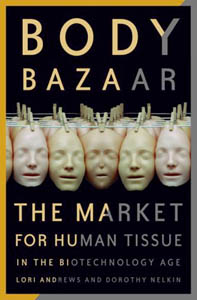![[MetroActive Books]](/gifs/books468.gif)
[ Books Index | North Bay | MetroActive Central | Archives ]
Creepy book says your body tissue is wanted, dead or alive
By
HOW MUCH would you guess a human body is worth? $100? $1,000? Back in the late 1960s, a number of folks--mostly high school science teachers--began gleefully spreading the deflating news that our bodies, when reduced to the base assortment of the chemicals, fluids, and fibers that we're all made of, is worth less than 20 bucks, wholesale. That's if you could even find anyone in the market for your vital fluids.
Well, heads up--the market has changed. Ask John Moore, a Seattle businessman who discovered that his UCLA doctor had been secretly harvesting Moore's blood cells, patenting the unique chemicals in his blood and selling them to a Swiss pharmaceutical company. The price tag: $15 million.
That Moore felt appalled and violated by this revelation is to be expected. That he got over his shock and sued the doctor for a portion of the profits is no surprise. But that the California Supreme Court eventually ruled against Moore, claiming he had no legal or financial rights to his own tissues, is an eye-opener. According to the court, its ruling was necessary to encourage venture capital investment and protect scientific progress.
It's hard to say what's more shocking: that we may not have legal ownership and control of our own bodies; or that, properly marketed, our bodies have become gold mines of financial opportunity. Can we protect ourselves from those looking to cash in on this development? If not, how can we cash in ourselves?
These questions, and others even more mind-boggling, are explored in a fascinating new book about the brave new world of bio-commerce. Body Bazaar: The Market for Human Tissue in the Biotechnology Age (Crown; $24.00), by seasoned science-and-medicine writers Lori Andrews and Dorothy Nelkin, is a highly readable, heavily documented hybrid. The relatively slender book--180 pages of text with 57 pages of footnotes--blends meticulously researched facts with dozens of unsettling true stories. Fairly reported and solidly scientific, The Body Bazaar reads like a creepy horror novel that gives you bad dreams but won't let you put it down.
According to Nelkin and Andrews, your tissue, blood, and bones are the $1s, $5s, and $10s of the biotechnology industry. The sack of cells we like to think of as our bodies has become the new currency in a $17 billion business. There are now over 1,300 biotechnology firms worldwide--companies that transform human tissue into products.
For example, the foreskins of newborn boys can now be used to grow new tissue for artificial skin. The unique antibodies in individual peoples' blood have been used to manufacture vaccines against hepatitis and other diseases. A common clot-busting drug uses material from the kidneys of deceased infants.
If this all seems relentlessly ghoulish--well, it is. But it's also entertaining. The book even offers a look at such colorful peripheral issues as body-snatching, biological performance art, and the bio-collectible market.
In one remarkable chapter, we learn the strange fate of Einstein's brain. It seems that when the famed scientist died in 1955 his body was cremated--but his brain was kept from the fire by Dr. Thomas Stolz Harvey, who performed the autopsy. Over the years, Harvey has used pieces of the brain for study and given Tupperware-entombed portions to friends as Christmas presents.
The book concludes with some thoughts on how we might be able to keep our own tissues from being sold in the Body Bazaar of the 21st Century. How much is that worth to you?
[ North Bay | MetroActive Central | Archives ]
Copyright © Metro Publishing Inc. Maintained by Boulevards New Media.
![]()
 Buy & Cell
Buy & Cell
From the March 8-14, 2001 issue of the Northern California Bohemian.